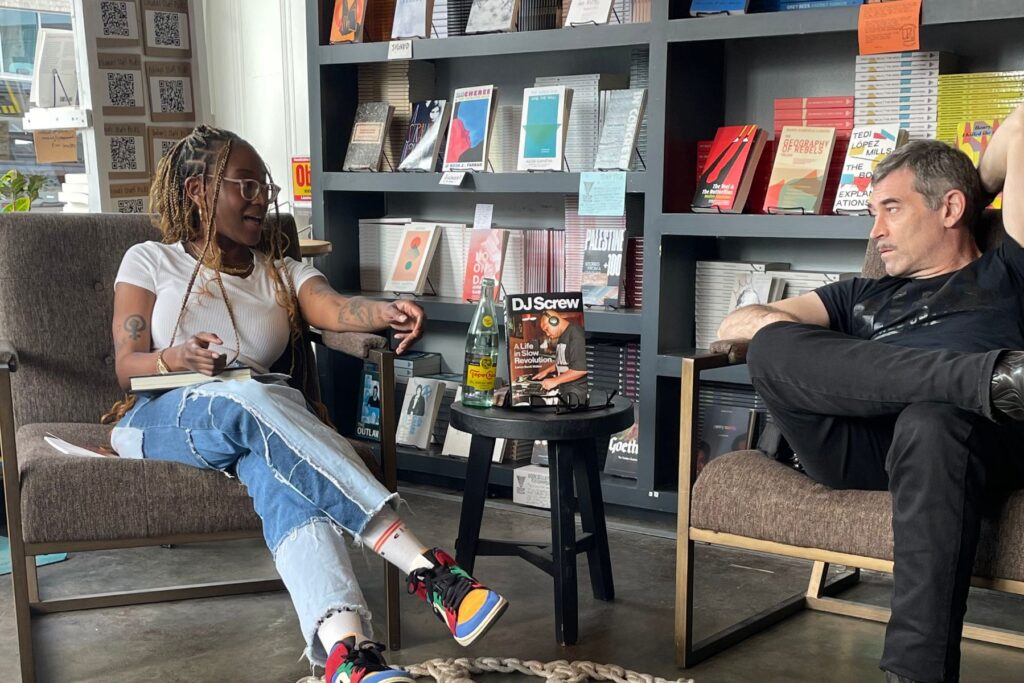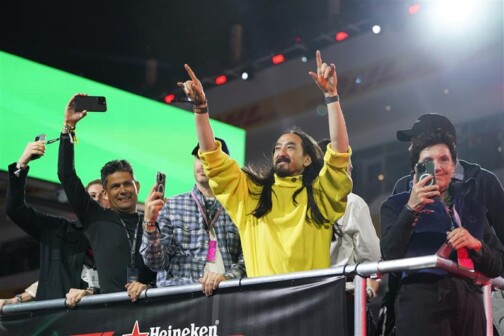Over the years, June 27 has evolved into a day of remembrance for DJ Screw.
Screw, whose name was Robert Earl Davis Jr., is a hip-hop legend across Houston and the broader south for pioneering the chopped and screwed sound that has inspired generations of rappers. That sound has made its way to New York City, Toronto (shoutout to Drake), and around the globe. In 2022, you can’t escape his influence. He did what he set out to do: Screw up the world. He just wouldn’t be here to see it.
Screw was only with us for 29 years, but his legacy is felt throughout contemporary hip-hop and continues to grow as Houston’s prominence as a hip-hop capital blooms. However, there is plenty to learn about the man behind the groundbreaking music that changed the world.
Last month, the University of Texas Press published A Life in Slow Revolution, the author and journalist Lance Scott Walker’s exploration of Davis’ life. It’s told through the voices of those who knew him. Davis’ family and close friends present a first-person look into the legend who, in his truest self, was a man who loved music.
“June 27” was recorded on rapper DeMo’s birthday and has become one of the most popular freestyles in the history of rap music. At 6 p.m. tonight, the Texas Theatre will welcome Screwed Up Click members Bird, DeMo, and Stick 1. Podcaster Donnie Houston will record a live interview with Bird and DeMo before Walker closes the night by chatting with Stick 1. They’ll screen the film DJ Screw: The Untold Story. Artists will set up in the lobby, and DJ Glockedup 225 will follow Walker’s chat with a jam session. (Head here for ticket information.)
After the book was released last month, I spoke with Walker at Deep Vellum about the research behind A Life in Slow Revolution, the book’s connection to the journalist’s earlier work Houston Rap Tapes, and the influence of women in Screw’s life. Get a taste for tonight’s event with a transcript from our chat.
The interview has been edited for length and clarity.
In the foreword for A Life in Slow Revolution, you mentioned that DJ Screw came up several times in your interviews for Houston Rap Tapes. What was the transition from the first text, a timeline on how hip-hop came to Houston and evolved over time, to the biography of DJ Screw?
[It was a] very, very slow transition. In 2004, photographer Peter Beste started Houston Rap Tapes on his own. He and I go way back to 1996. I was playing in punk bands. He was a little kid, up front with a ponytail, taking pictures. He was studying photography and on his way to becoming a world class photographer. When he moved away, we stayed in touch. I went to visit him in Chicago, New York, London and everywhere he lived. After he made a couple of trips down to Houston from New York City, where he lived at the time, he percolated on an idea of a book about gangsta rap in Houston.
At the time, I was writing for the Houston Chronicle. He said [to me] , “You know, you’re a writer. You need to come on board with me as I go and take pictures of people. The pictures are one thing, but the stories are missing from the pictures.” I jumped on board with him because I’m from Galveston, but you know, I have lived in Houston since 1992.
I loved Houston. I was in love with Houston. I obviously dedicated my life to it, so I started interviewing everybody in Houston that we could. Swishahouse, Screwed Up Click, Geto Boys, South Park Coalition. After working on that for a year or two, I was obviously interviewing people about Screw, but it was the way that people talked about him that made me go “wow, he’s really special.”
Yeah, we knew that. But like, he’s a special human being. That’s what got me thinking about putting together a book on just him, around 2006. In 2008, I started to flow the idea around to some people in the Screwed Up Click, but I didn’t announce it for years. The first time I spoke to a publisher about it and put together an actual manuscript is 2014 – 2015.
I love hearing from music journalists about their reporting process. How was that process for you? You were the first [journalist] to get those stories that people have kept in their hearts for so long. I think we forget these were people’s loved ones. You have stories from his childhood friends in Smithville, him playing with records from the army base. These are memories that someone is trusting you with. How was that relationship building process for you? I’m assuming it took time.
It took time and cosigns. You know this as a journalist, when you’re asking questions of somebody you know or don’t know, your questions are telling them everything about you. How you perceive the world, how you filter the world, how you process things, whatever it may be. In the process of interviewing somebody, yes, you’re learning about them, but they’re learning about you in the process.
Sometimes, you’ll get an interview with somebody where they open right up and it’s like, ‘oh, man, I’ve been waiting my whole damn life to tell the story.’ Those were amazing because there were a lot of people who have never been interviewed. The guy getting records from the military base, he had never been interviewed. DW Sound, the DJ who had turntables that Screw borrowed early on, had never been interviewed. So I was lucky with those guys.
Shorty Mac, Screw’s best friend and his cousin, connected me to them. My relationship with Shorty Mac goes back 18 years. I met him really early on and have been able to talk to him here and again. There are definitely people I have become close to over the years. You just can’t help it.
Earlier today, I was discussing the chapter where you mention J Prince of Rap-A-Lot and the record labels of time where they felt Screw was stealing from them in the sense, but local radio was looking at Screw as a tastemaker. It reminded me of NPR’s Louder Than A Riot episode about DJ Drama, and how record labels looked to Drama as a curator of popular music. Both of them, especially Screw, predicted all the trends that were to come. When you were researching, reviewing his work, and interviewing people who knew, did you find any moments that predicted that he would later become this magician?
His mother was this huge influence. People associate Screw with the south side of Houston, but the truth is, when he was a kid, he lived on the north side of Houston. Which is a big shocker for some people because the north side and south side of Houston was like this [Walker makes clashing symbol.] Not now, but in the 90s. It was like, if you drove a red car, you did not take that red car to the north side of Houston. If you drove a blue car, you did not drive it on the south side of Houston.
He was growing up on the north side of Houston and there were several record stores there, Fifth Ward, Cashmere Gardens and Third Ward. His mother was a big record enthusiast. We’re talking about ‘70s, folk, r&b, Roger Troutman, Tower of Power, Quiet Storm, and a variety of r&b. She would buy those records and make tapes for friends of hers, which is something you would do back in the day.
Because she was hustling, working several jobs, and selling tapes was something else she could do where people would pay. Screw picked up on that enthusiasm from his mother and her love for music. Obviously, those are the first records he get his hands on. A few years later, he discovers hip-hop and turntablism in Smithville. He’s taking those records and messing with them.
He decides if he doesn’t like the song he’s going to find a screw on the ground and scratch up the song. That’s when Shorty Mac goes, ‘What do you think you are, DJ Screw?’ And he’s like, ‘yeah.’” That’s where the name comes from. I’d say his mother was a massive influence on him.
Lately, I have been reading It Was All a Dream: Biggie and the World That Made Him by Justin Tinsley. I can’t help but make the parallel between Screw and Biggie. I think about Big’s mom migration’s story from Jamaica to New York and how that influenced him. The same thing is reflected in Screw’s story. Sometimes the way hip-hop has been archived and reported comes a masculine perspective, similar to how Diddy and his songs are marketed as the king and prince of Bad Boy. With Screw, we see this maternal influence and motherly love. I feel that when he talks about the members of Screwed Up Click as his family. He invited people into his house to sit for hours. I feel like you felt the love people had from him, which could be why they felt protective of those stories, because to him he was not an icon, but someone they loved.
Thank you. You are the first one to pick up on the fact that the book is really about the women in Screw’s life. It’s about his sister, his mother, and his long-term girlfriend. It’s really the core of the book. You’re the first person who has ever said that. It’s true because the book is dedicated to his sister. His mother only really did one interview. I mined as much as I could because I really wanted her in there. I knew what his relationship with his dad was. Every little boy looks up to their father in some way, but he wasn’t a positive influence. His mother absolutely was.
I think that gave him that sense of family, of appreciating the people around him, and he started to build a family. A couple of people from Smithville pointed out to me that he grew up in the country. He spent his first nine years in Houston, was born in Bastrop, and his family lived in Smithville.
And he was born, then they moved to Houston. He kind of grew up in Houston. Once he got to the country, he became his full self, he became himself. Being out in the country, being with his family, and it just opened up something in him, and that gave him his sense of family. It was something he carried with him his entire life and building that family around himself.
Click here to purchase A Life in Slow Revolution from University of Texas Press.
Author







